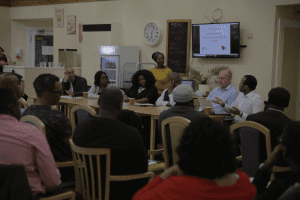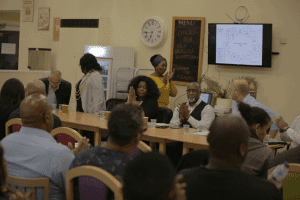Developing Strategic Leadership for Underrepresented Communities
Added: 18/03/2021
Voluntary Action Leeds
New Project at VAL
Voluntary Action Leeds is starting a new project that aims to support the development of people from underrepresented communities. The project will help underrepresented communities access opportunities to become school governors trustees, as well as support in becoming strategic influencers and improve their own organisations governance structures.
And organisations who want to be more diverse and inclusive will be offered a programme of learning and development to support them with this.
The project was an idea originally from the Leeds Culturally Diverse Hub (formerly the Leeds BME Hub) at Voluntary Action Leeds (VAL). It looked at strategic leadership in culturally diverse communities and recognised there was a gap in strategic leadership/representation in Leeds.
The Hub hosted an event that sparked interest in developing a project to address the gap in strategic leadership in underrepresented groups. When funding became available, VAL took the decision to invest in developing a project in this area of work, and here we are about to begin a new journey.

Who is the project for?
The project is for people who are underrepresented in strategic voice and influence and organisations who want to be more inclusive and diverse.
The project aims to work with 50 organisations and 30 people from underrepresented communities throughout 2021. 10 individuals, 5 organisations and 5 schools will be identified after they have completed the programme. The individuals will spend some time on the board/committee or school board to enhance their learning and development and provide a diverse perspective to their chosen board/committee or school board.
What will the project do?
The project will provide training and support to organisations wanting to diversify their policies, procedures, and practices, be more welcoming and inclusive, and address the issues of inequality within their organisations using tool kits, training and resources, example (Cultural Cohesion Quality Mark, Micro Aggression Tool Kit).
- A programme of training and development will be provided to support people from underrepresented groups to develop their strategic skills, this will include an opportunity to sit on a board/committee or school governing body with one of the organisations who want to be more diverse and inclusive, and they will have support from a mentor who will support them during their time on the board/committee or governing body. The individuals will also receive capacity building support from the project worker at VAL to work with their own organisations board/committee or school governing body.
- A programme of training to support organisations who want to diversify and be more inclusive will be offered Cultural Competence training, Quality Assurance Standard “Cultural Cohesion Quality Mark, Challenging Conversation session, tool kits and handouts to support their work to be more inclusive and diverse.
When will the project take place?
The project is being piloted for 12 months from January to December 2021 with a plan to create a piece of work that will become part of the services VAL provides to communities from underrepresented groups and organisations and schools who want to be more diverse and inclusive in the long-term.
Where will the project take place?
The project will focus on Leeds individuals, organisations and schools, but if anyone from within the West Yorkshire region would like to take part they would be welcomed.

Why are we doing this project?
Evidence has shown that there is a lack of strategic leadership where decisions are being made in society from underrepresented groups. In the broadest sense, this includes people from Culturally Diverse communities. This terminology is currently being used by VAL as an alternative to BME/BAME. The term refers to all minority groups from the African Continent, Caribbean, Asian Continent including (South and East Asia, and South East Asia, Bangladeshi, Kashmiri, Pakistani, Indian, Chinese, Malaysian, Korean, Japanese, Vietnamese, and any other groups from these regions) Eastern Europeans including Gypsy, Roma and Traveller communities. People Who Have Experienced Racism are less likely to be represented across society, so the focus of this work is Culturally Diverse communities.
2020 proved to be a challenging year for everyone with the pandemic impacting heavily on people’s lives and the realisation that people from Culturally Diverse communities were disproportionately affected and more likely to die from COVID if infected than their white counterparts, (Public Health England report). The tragic brutal murder of George Floyd and, the resurgence of the Black Lives Matter Movement, allowed people to see the injustice toward black people on national TV and social media platforms whilst everyone was in a lockdown. It forced everyone to see it and acknowledge what has been going on for centuries where systems are deliberately designed to exclude difference and keep out the unfavourable.
In education, evidence has shown a lower educational attainment for Caribbean boys in secondary education, which reduces the opportunity to go into higher education or pursue an academic career, and careers advisors often discourage children from some culturally diverse communities from going into higher education or pursuing skilled professions like Law, medicine, and sciences.
Health inequalities have always been there but COVID 19 highlighted this more through the disproportionated impact COVID 19 had on certain communities, this also shone a spotlight on the socio – economic inequalities faced by culturally diverse communities in the whole of society.
Employment discrimination has shown that more people from culturally diverse communities work on the front line and in lower paid jobs and were more exposed to the virus. More people from culturally diverse communities live in deprived areas and have poorer health outcomes. A lower proportion of people from culturally diverse communities are senior managers or chief officers compared to their white counterparts. Pakistani/Muslim communities are more likely to be victims of Race Hate Crime because of Islamophobia.
Last year’s events highlighted the disproportionate impact COVID 19 was having on Culturally Diverse Communities and highlighted the systemic racism that is inbuilt into the fabric of society. This system puts barriers in the way of people from Culturally Diverse groups not allowing them to have fair and equal access and opportunities, therefore leading to the inequalities in health and social care, education, employment, finance and more.
The ACEVO Home Truths Report say’s “(The charity sector has a problem with racial and ethnic diversity. Black, Asian and Minoritised Ethnic (BAME) people are under-represented in the sector and those who are in charities can be subject to racism and antagonism not faced by white colleagues. The sector is not alone in the relatively negative position of BAME people within it. This situation is a feature of wider society. However, the issue seems especially problematic in the charity sector because it is expressly built on commitments to justice and equality)”. ( ACEVO Home Truths Report, Undoing Racism and Delivering Real Diversity in the Charity Sector Dr Sanjiv Linngayah, Kristiana Wrixson, Maisie Hulbert.)
Research has shown that the problem in the charity sector and other sector’s is not simply an absence of Culturally Diverse representation. Once involved, significant numbers of Culturally Diverse people experience discrimination and harm. Research suggests that this situation is linked to the prevailing culture of society.
Meaning that long-standing habits, practices, and norms will have to change in order to improve how sections of society works with and serves Culturally Diverse people. (ACEVO Home Truth’s report)

With all this going on, there is an opportunity for society to begin to have open conversations about racism, discrimination, micro aggression, unconscious bias, white fragility, white privilege, gate keeping and all the negative behaviours taking place which contribute to the current unfair climate. These conversations might be difficult to have at first, but it is an integral part of the learning and healing process and the journey to real equality and diversity in our society.
It’s about time society made the changes needed to create a fair and equal society for all, and stops the systemic racism that’s poisoning society and creating massive gaps of inequality and perpetuating more hate crime, poverty, poor housing, ghettoization, poor educational attainment, low paid work or Universal Credit, criminality, gang culture, drugs and alcohol misuse, health disparities, access to quality health care and a blatant lack of representation in senior management roles and on strategic decision making boards and committees.
What are our goals for the project?
The goal for this pilot project is that it evolves into a fully fundable project that will provide coaching, mentoring, training, development, capacity building and accessible information, advice and guidance for community leaders who want to improve their strategic engagement skills and strengthen the governance of their own trustee boards/school boards and committees on an ongoing basis.
We want to work with school governing boards, organisational boards/committees to support them in becoming more inclusive and diverse in their practices and structures, while providing safe spaces to facilitate conversations about racism, offering training and resources for learning and development.
Cultural Competence is a necessary tool to correct systemic racism and provide a way forward for organisations to begin to diversify their structures, policies, and practices to allow for the change to occur.
Cultural competence – is non-threatening because it acknowledges and validates who people are. By focusing on the organisation’s culture, it removes the need to place blame and assume guilt. Since becoming culturally competent focuses on the “how-to” of aligning policies and practices with goals, everyone is involved in the process. This “inside-out” model relieves the outsiders (or excluded or underrepresented groups) from the responsibility of doing all the adapting.
Working in a diverse environment is more enriching and supports a future of fairness, respect and equality of difference where everyone feels valued. Professor Tony Chapman says in his report “Organisational cultures largely echo mainstream culture in its sense of time orientation, perception, and use of time. An organisational culture may not lend itself to cultural competence, so that’s where skill building comes in. A culturally competent organisation brings together knowledge about different groups of people and transforms it into standards, policies, and practices that make everything work”.
A report by Professor Tony Chapman on Diversity and Inclusion in Third Sector Leadership, and ask the question “Why is it Not Happening”
Just saying “we are open to all” is not enough to create a diverse environment that acknowledges and celebrates difference and embraces change for the better, there is much more work to be done. Understanding the concept of Cultural Competence and why it’s so important to achieving a culturally diverse environment that reflects the diversity of the cities we live and work in.

- “Cultural competence” A culturally competent organisation has the capacity to bring into its system many different behaviours, attitudes, and policies and work effectively in cross-cultural settings to produce better outcomes.
- “Cultural sensitivity” is knowing that differences exist between cultures, but not assigning values to the differences.
- “Cultural awareness” is the next stage of understanding other groups being open to the idea of changing cultural attitudes.
This project is a unique opportunity to address the imbalance created by systemic racism and discrimination within our society. We aim to:
- Support the development of a new cohort of effective leaders from culturally diverse backgrounds
- Work with change leaders and change makers in organisations and schools who want to diversify and be more effective in their work
- Be the change that is so desperately needs to be created for a more fair, balanced, and equal society for everyone for generations to come.
